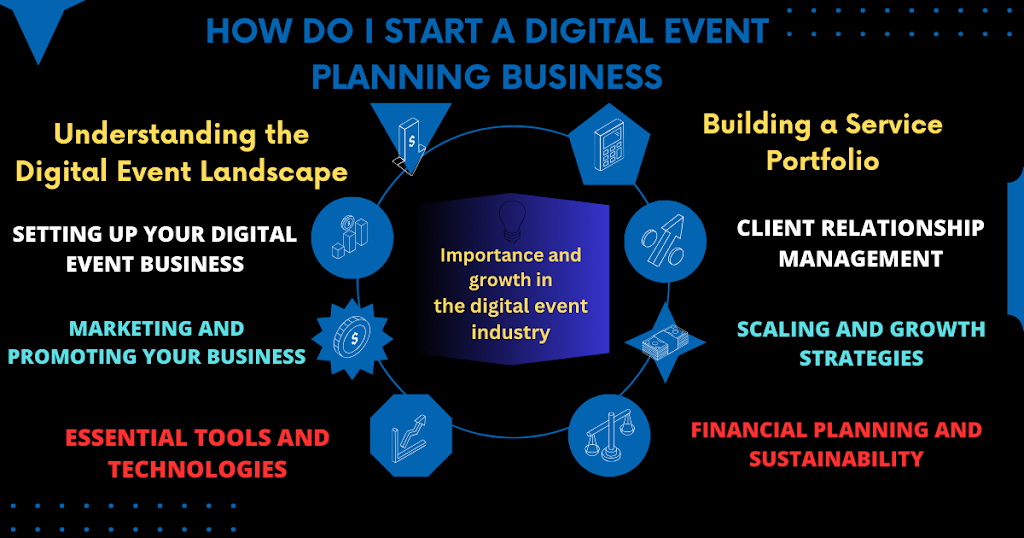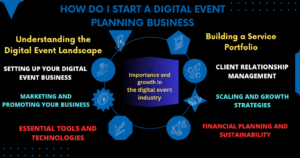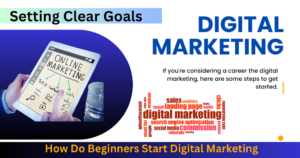Digital Event Planning Business:
Table of contents:
1. Introduction
- Definition of digital event planning
- Importance and growth in the digital event industry
- Brief overview of the article
2. Understanding the Digital Event Landscape
- Current trends in digital events
- Identifying niche markets and target audience
- Researching competitors
3. Setting Up Your Digital Event Business
- Crafting a business plan
- Legal considerations and registrations
- Building a strong brand identity
4. Essential Tools and Technologies
- Software and platforms for event management
- Marketing tools and strategies
- Budgeting and financial management tools
5. Building a Service Portfolio
- Types of digital events to offer
- Creating customizable packages for clients
- Implementing innovative ideas and concepts
6. Marketing and Promoting Your Business
- Developing a robust online presence
- Utilizing social media and digital marketing strategies
- Networking and partnerships
7. Client Relationship Management
- Effective communication strategies
- Providing exceptional customer service
- Obtaining and leveraging client feedback
8. Scaling and Growth Strategies
- Scaling your business operations
- Expanding service offerings
- Staying updated with industry trends
9. Financial Planning and Sustainability
- Managing finances and cash flow
- Strategies for profitability and sustainability
- Investing in growth and innovation
10. Conclusion
11. FAQs
I. Introduction
Definition of Digital Event Planning
- Digital event planning involves strategizing, organizing, and executing events exclusively in the online sphere. It encompasses a wide array of activities, Virtually involved from conception to flawless implementation.
Importance and Growth in the Digital Event Industry
- The digital event industry has witnessed exponential growth, attributed to its cost-effectiveness, global reach, and flexibility. With businesses increasingly shifting to virtual landscapes, the demand for well-executed digital events continues to soar.
Brief Overview of the Article
- With the help of this extensive book, you should be able to start your journey in the field of digital event planning with the information and tools you need. From understanding the landscape to establishing a robust business, each step is outlined to ensure your success.
2. Understanding the Digital Event Landscape
Present-Day Developments in Digital Events
- Technology advancements have made it possible for novel event forms, such as virtual reality (VR) events, hybrid events blending online and offline experiences, and interactive webinars. Understanding these trends will help in crafting unique event experiences.
Identifying Niche Markets and Target Audience
- Identifying specific niches and understanding the target audience’s preferences are crucial steps. Tailoring events to cater to niche interests ensures higher engagement and client satisfaction
Researching Competitors
- Analyzing competitors aids in identifying gaps in the market and devising strategies to differentiate your services. It provides insights into successful strategies and potential areas for improvement.
3. Setting Up Your Digital Event Business
Crafting a Business Plan
- The cornerstone of each profitable endeavor is a clearly stated business plan. Your target market, revenue sources, business objectives, and marketing plans should all be outlined.
Legal Considerations and Registrations
- Navigating legal aspects is pivotal. Registering your business, obtaining necessary licenses, and understanding compliance requirements ensures a smooth operational journey.
Building a Strong Brand Identity
- Crafting a compelling brand identity sets you apart. This involves creating a logo, defining brand values, and establishing a consistent brand voice across all communication channels.
4. Essential Tools and Technologies
Software and Platforms for Event Management
- Utilize specialized software and platforms tailored for event management. Tools for registration, ticketing, attendee engagement, and live streaming are crucial for seamless execution.
Marketing Tools and Strategies
- Make Use of digital marketing resources like social media SEO and email campaigns to reach your target audience effectively. Engaging content and strategic campaigns amplify your visibility.
Budgeting and Financial Management Tools
- Efficient financial management is key. Adopting budgeting tools and strategies to track expenses, manage cash flow, and ensure profitability is essential for sustainable growth.
5. Building a Service Portfolio
Types of Digital Events to Offer
- Explore diverse event formats – webinars, virtual trade shows, product launches, and more. Tailoring services to suit various client needs widens your market appeal.
Creating Customizable Packages for Clients
- Offering customizable packages provides flexibility. Customers value customized solutions that address their unique event needs.
Implementing Innovative Ideas and Concepts
- Staying innovative sets your business apart. Implementing unique concepts and technologies keeps events engaging and memorable.
6. Marketing and Promoting Your Business
1. Developing a Robust Online Presence
Make use of social media sites and a business website. Consistent branding and engaging content enhance visibility and credibility.
2. Utilizing Social Media and Digital Marketing Strategies
Harness the power of social media for outreach. Engage with potential clients through compelling content, live sessions, and interactive posts.
3. Networking and Partnerships
Forge partnerships within the industry. Collaborating with vendors, influencers, and complementary businesses expands your network and potential client base.
7. Client Relationship Management
Effective Communication Strategies
- Clear and prompt communication is vital. Establishing effective channels for communication ensures smooth interactions with clients throughout the planning process.
Providing Exceptional Customer Service
- Deliver exceptional service to clients. Address their needs promptly, offer solutions, and ensure a seamless experience to foster long-term relationships.
Obtaining and Leveraging Client Feedback
- Feedback is invaluable. Solicit feedback post-event and use it to improve services. Positive testimonials also serve as powerful marketing tools.
8. Scaling and Growth Strategies
Scaling Your Business Operations
- As demand grows, scale operations efficiently. Hiring additional staff, streamlining processes, and expanding services facilitate growth.
Expanding Service Offerings
- Diversify your services to cater to evolving client demands. Introducing new event formats or specialized services keeps your business competitive.
Staying Updated with Industry Trends
- Constantly evolving is key. Stay updated with industry trends, technological advancements, or emerging event formats to remain relevant.
9. Financial Planning and Sustainability
1. Managing Finances and Cash Flow
Maintain a robust financial strategy. Monitor cash flow, manage expenses, and allocate resources wisely for sustainable growth.
2. Strategies for Profitability and Sustainability
Implement strategies to ensure profitability. This may involve optimizing pricing structures and identifying cost-saving measures.
3. Investing in Growth and Innovation
Allocate resources towards innovation. Investing in new technologies or talent fosters innovation and keeps your business ahead in the industry.








.jpg)